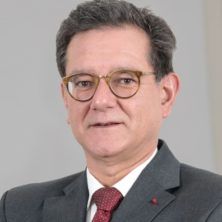There are 10 000 kilometers between Ukraine and Guatemala. But these two different countries have one thing in common – absolutely worn out justice system that ruins seeds of trust in the state. Guatemala has found a solution to this issue by punishing the most notorious criminals and reforming the justice system. One of the authors of the Guatemalan judicial reform, Carlos Castresana suggests using this formula in Ukraine. What exactly is he offering?
“Justice is a very addictive drug: the more you get, the more you want”
— Carlos Castresana
People in Ukraine are unlikely to follow political events in Guatemala. But there are sometimes important lessons to be learned from unexpected places—a recent visit to Kiev has convinced me that this is one of those cases.
The two countries are clearly very different. Guatemala is a small country in Central America whose politics are still scarred by 36 years of a civil war that ended in 1996. Ukraine, its population three times larger, is struggling to live up to the reformist ideals that fueled the 2014 Maidan protests, and to deal with a simmering conflict with eastern separatists and Russian forces, as well as Russia’s occupation of Crimea.
But there are similarities. Both have been plagued by high-level corruption, and by historical networks of criminal influence that have undermined confidence in the courts and criminal justice system. Both have been struggling to address grave crimes—in Guatemala’s case, atrocities perpetrated by state forces during the civil war, corruption and organized crime; in Ukraine, the killing of over 100 demonstrators during the Maidan protests, and crimes being committed during the conflict in the east, which still smolders.
So what lessons does Guatemala’s recent history offer Ukraine? I was recently in Kyiv to talk about my experience from 2007-2010 heading a unique institution—the International Commission against Impunity in Guatemala, generally known by its Spanish acronym CICIG– after it was set up by the United Nations, in response to an appeal for help from the Guatemalan government in its then-losing battle against crime. Guatemala has shown that ability and willingness can be built even in the most hostile environments, that impunity can be successfully fought, that with support of the international community and civil society, collapsed security and justice systems can become functional again and provide effective protection to their citizens.
CICIG is headed by an international jurist (I am Spanish; the current head, Ivan Velasquez, is Colombian). It is staffed both by international and local investigators, and it has the power to bring prosecutions under its own name in Guatemalan courts, jointly with national prosecutors.
Working alongside dedicated Guatemalan investigators, prosecutors, and judges, international involvement has yielded stunning results. Last September, a CICIG-backed investigation into corruption in Guatemala’s customs service led to the resignation of then-president Otto Perez Molina and his vice-president, Roxana Baldetti, amid mass protests by an outraged public. The two are currently on trial.
In addition, CICIG has strengthened the justice system. It has introduced modern investigative techniques that reduce the reliance on witness testimony, helped to strengthen protection mechanisms for those witnesses who are essential, and spurred the creation of high-risk courts for sensitive cases that offer protection to judges and their families (one of these courts is currently trying the former president).
Justice is a very addictive drug: the more you get, the more you want. With these new legal tools and equipment, emboldened national prosecutors have brought ground-breaking domestic cases of genocide, crimes against humanity, and war crimes against retired generals, including the prosecution of a former military dictator Efrain Rios Montt. This is heroic work.
Could something like CICIG or a different successful model from Bosnia work for Ukraine? Kyiv too is struggling to build effective, independent courts out of a system that has clearly lost public support (surveys indicate that less than 10 per cent of the population trusts the courts).
What might all of this look like in Ukraine? International prosecutors and judges could be inserted into existing and proposed Ukrainian institutions, including the new National Anticorruption Bureau, a planned Anti-Corruption Court, and dedicated offices for war crimes. Ukrainian reform advocates believe that such a model could be adopted by changing laws, but without need for constitutional amendment. The international role would be temporary, and phased out as deeper reforms are implemented.
Bilateral and multilateral partners have kept Ukraine financially afloat. Supporting some version of an internationalized model would provide a concrete way to support the rule of law and address the crime and impunity that threaten to corrode state institutions.
International donors may be tempted to support such an approach for anti-corruption but have less interest when it comes to war crimes and crimes against humanity. That would be a mistake. As Guatemala experienced before CICIG, without accountability, the networks responsible for atrocities one decade almost inevitably end up running crime syndicates in the next. And there must be impartial accountability if victims of torture, forced displacement, and sexual violence on both sides of the conflict are to develop trust in state institutions, and a shared understanding of Ukraine’s turbulent history.
Ukraine’s ability to withstand Russian aggression and consolidate its democracy requires economic stabilization and public trust in state institutions. Yet neither is likely while grand corruption and grave crimes go unpunished. Guatemala offers Ukraine hope that structural impunity can be overcome. People can recover trust in their judiciary, but only if courts demonstrate that nobody is above the law.
Attention
The author doesn`t work for, consult to, own shares in or receive funding from any company or organization that would benefit from this article, and have no relevant affiliations



